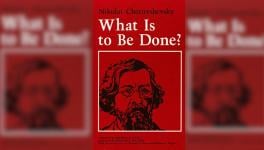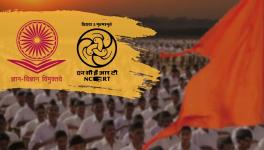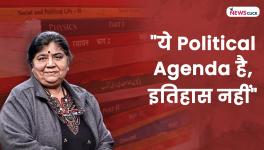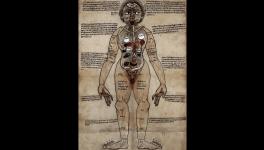Revisiting the Popular
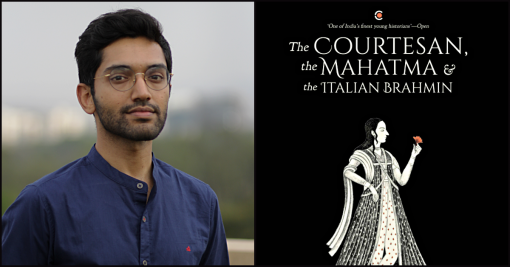
Mukulika R of the Indian Cultural Forum spoke to Manu S Pillai about his recently published book, The Courtesan, the Mahatma and the Italian Brahmin, in which he seeks to rediscover multiple characters from the country's past – from Basava and Nangeli to Phule and Macaulay. He also talked to us about history as an "instrument of vengeance", his choice to stay between writing academic and popular history, the rise of anti-intellectualism in the country and more.
Mukulika R: The book, divided into three parts, is a treasure trove of multiple chapters narrating the histories of various characters from the country’s past. Is there a running link that connects all these characters?
Manu Pillai: Though I don’t state it in so many words anywhere in its pages, there are three key themes that the book highlights, which also happen to be the major areas I study. This is, in fact, reflected in the book’s title too. The “Courtesan” refers to gender and the idea of understanding Indian history through the eyes of female protagonists. Courtesans are of particular importance here because they were literate, mobile, sexually autonomous, economically and even politically powerful figures who actively contributed to the shaping of culture. To study them really opens up our history not through kings, battles, and dates alone, but also through the work done by women. This extends also to Bhakti saints and our intellectual tradition: their language may be one of devotion but couched within are potent, even subversive messages. We can see Mirabai purely as a Krishna bhakta, for instance, or we can also recognise her rejection of Rajput society and its conventions of patriarchy—when she refuses to become a Sati, for instance, and later walks out of her late husband’s palace, defying every social expectation placed upon her. These aspects too are of historical significance.
The “Mahatma” refers to the other theme I cover, which is caste because the Mahatma in the title refers not to Gandhi but to Phule, who was the chief anti-caste crusader of the nineteenth century. And the “Italian Brahmin” encapsulates human quirk. That is, it highlights these colourful, interesting, and completely human figures of the past, in an attempt to challenge our longstanding tradition of viewing historical men and women as divine beings. We see the people of the past as either villains or heroes, whereas they were also, like us, human. Some of them manifested greatness, others revealed deep flaws. Some would surprise us: for instance, the Maratha prince of Thanjavur called Shahu, who was Shivaji’s nephew. In a Telugu play he wrote he lampoons the caste system, parodies Brahmin airs of superiority, and even has a line on beef-eating, which would probably provoke a riot if a playwright articulated it today. Men and women such as him not only challenge our preconceptions of what historical figures were like, but also hold up a mirror where to identify our own biases, prejudices, and weaknesses. The past is not merely what we imagine it is—it can surprise and even shock us.
MR: In the Introduction to the work, you mention how history is “polarised” and used as an “instrument of vengeance” in contemporary India. What role do historical characters like these play in difficult times like ours?
MP: The use of history for politics is not new. All parties and groups across time have done it. History in that sense serves as a source of raw material by which ideologies and political movements legitimise themselves—you pick and choose and give legs to your stated goals. But there is no point lamenting it, because the political class will always be tempted to do this—what we must aim to do is understand history in its own context. This takes away judgment and reveals historical figures in their own time and place, rather than marshalling them to justify current prejudices. For instance, take Tipu Sultan who has become a deeply polarising character. To some he is a bigot who demolished temples and forced mass conversions; others cite grants he gave to temples, and the fact that many of his courtiers were Hindu. Context shows us that it is not a matter of either/or. It is both. The same king could act in completely contradictory ways in different contexts. In a territory under conquest Tipu was admittedly brutal—violence, temple demolishment, conversions, and so on. But in his settled territories, he did the exact opposite, patronising Hindu institutions, employing Brahmins, and so on. If we are able to understand the significance of context—and I try to explain this in the book, not through sermonising but with examples—we will be less susceptible to political mischief and diversions. If we can’t expect the political class to stop twisting and perverting history, we can at least learn to recognise it when they do so.
MR: The ‘Mahatma’ in The Courtesan, the Mahatma and the Italian Brahmin is Mahatma Jyotiba Phule. How does Phule fit into this assortment of legendary figures and how different was he in real from the popular narrative that surrounds us?
MP: Phule in general imagination is venerated as a social reformer and a man who opened widow’s homes and girls’ schools. These are, of course, significant achievements and he worked against the odds to accomplish what he did in these areas, aided by his formidable life partner, Savitri Bai. But while there is focus on this, what is played down in public is the fact that he was also a man with a brilliant, radical mind. He was not interested just in expelling the colonial, foreign enemy—he wanted to uproot inequalities within Hindu society, and bring about massive internal transformations. He was capable of very polemical writing: Pune, where he lived and worked, was the seat of Brahminical orthodoxy in Western India, and here when Brahmins claimed they were superior because of their mythical birth from the head of the cosmic creator, Phule had the confidence to ask whether this meant the cosmic creator menstruated through the mouth. To know that he did this in a city where, only decades before, the Peshwas presided over a highly orthodox social system is fascinating. Equally, his worldview was not myopic. His famous book Gulamgiri he dedicated to the people of the United States for abolishing slavery—just the kind of radical change he espoused. Long before Gandhi went to Buckingham Palace in a loincloth, Phule appeared in tattered clothes at a banquet in honour of Queen Victoria’s grandson, reminding the dignitary that the people he saw in ballrooms and colonial halls were not representative of the masses on the street. He also complicates our understanding of colonial rule as pure evil—Phule, after all, used British legal systems which were less unequal compared to orthodox Hindu rules to liberate lower caste communities. That is the Phule I have tried to highlight through the book. We have, in essence, taken the politically correct side of Phule and garlanded it, but the politically inconvenient aspects of his legacy are buried deep under the flowers. He deserves a serious resurrection from there.
MR: You’ve mentioned in an interview that you “don’t write like an academic”, but choose to be a “bridge” between academic and popular history. Why is it so?
MP: I have a foot in both worlds. My ongoing PhD for instance keeps me engaged with the academic space, but in terms of writing and publishing, I am not particularly interested in the seminar circuit. What I want to do is present well-researched, sound, rigorous history in a way that appeals to larger audiences. We have a wealth of history in this country with the most magnificent gems—much of this remains restricted in academia, which is what I would like to try and “bridge”. So far it has worked. My first book The Ivory Throne is built on six years of archival research, but the writing itself is tailored for a mass audience. The formula seems to have worked because a panel of scholars awarded it the Sahitya Akademi Yuva Puraskar. So too with my second, Rebel Sultans: I engage with the latest academic material on Deccan history, but write for the intelligent layreader, and the book was well received not only in the general press but also peer-reviewed glowingly in an academic journal. In that sense, The Courtesan, the Mahatma & the Italian Brahmin is my lightest book. The idea here is to generate an appetite for history in new, young readers, so that they can get a flavour of India’s past without getting overwhelmed. And having cultivated a taste, they can graduate to heavier books, such as my previous two.
MR: The current regime thrives on a virulent brand of anti-intellectualism. Do you see a role for writers in the mass political discourse of today's India?
MP: Populism thrives on certain fictions, many of which do not stand up to historical scrutiny, and intellectuals puncture such fictions with reason, factuality, and basic common sense. More importantly, the virulence is also due to the absence of strong intellectual traditions on the side of the populists, which leads to a colossal inferiority complex. In principle, it is not necessarily a bad thing to have a conservative wing in a country’s politics and intellectual life. What is puzzling is that in India political power has shifted into right wing hands, but this faction still lacks intellectual heft, compensating for it with a perpetual and invented sense of victimhood. Writers must, of course, continue to do what they do. People lament that not enough young Indians are reading books now, etc., and there is some truth to it, especially since we are surrounded by new media and technologies that drown us in distractive untruths. However, the good thing about a book is that even if it sits gathering dust on a shelf for 50 years, when it is dusted and picked up, it still possesses value. Writers will always have a role in the political discourse, because words and the world of ideas and thought are exceedingly potent. After all, this is the reason why fascists burn books.
MR: You had once, during the release of your book in Kerala, mentioned how Savarkar's mercy petition should not be held against him. Can you explain this a bit more? Especially now as Savarkar is back in the current political discourse because the local wing of the BJP in Maharashtra announced in their election manifesto that they would propose his name for the Bharat Ratna. Having grown up in Maharashtra, you must be familiar with popular, linear narratives that exalt Savarkar as a valorous freedom fighter. What do you think is BJP’s intention?
MP: I remember in my teens that there was a movie made on Savarkar, and all of us from school were packed into a bus and driven to watch this. In Maharashtra he certainly remains a man of great significance, more so among powerful upper caste groups rather than across the board (which is important to note because upper caste groups continue to dominate the discourse in great measure). On the mercy petitions: while it is fashionable on social media to flog him for submitting these, I don’t find sitting in judgment over that act to be appropriate in a historical sense. This comes from a basic position that it is not for a historian to judge historical figures. This is easier said than done. For instance, it is difficult not to judge Hitler. But what is of greater interest to a historian is not judging the man as much as understanding why he became what he did; why an entire nation followed him; why great powers were for a long time happy to play ball with him—from this we can draw lessons for our own time. So too with Savarkar: as I wrote in a recent review in Open, it is petty to sit in judgment because he couldn’t endure prison torture—what is more important is what he did after he emerged. Prison experiences transformed a man who was quite different when he went in—why did he change, what led him to articulate Hindutva, why did he whitewash so much of his story: these are the questions that interest me. His vision has now mutated into something of great power—if we are ever to figure out how to deal with it, we must also comprehend the man who birthed the idea in the first place. Going in clouded by judgment precludes a thorough understanding.
As for the BJP’s intentions and his place as a freedom fighter: much of the odium he provokes today is a consequence of Hindutva. But his life has several chapters. The Savarkar who by the early age of 23 was already being tailed by the police in Pune for his revolutionary propensities is one character. In this phase he was a proponent of Hindu-Muslim unity, calling the two groups children of the same mother. Then there is Savarkar of the prison, who went in with much grandstanding and bravado about suffering for the nation, but ultimately broke in prison and submitted mercy petitions. But that period in prison is also when his mindset changes. And that leads us to the third Savarkar who is the father of Hindutva and later was embroiled in Gandhi’s assassination—the very avatar which many people despise. While such abhorrence is understandable, it is equally important to reflect on his earlier avatars. Till his arrest in 1911, for instance, he was a hero, and when many in Maharashtra talk of him as a freedom fighter, they highlight this period of his life when he was translating the biography of an Italian revolutionary, publishing seditious material, smuggling in guns, and so on. With him again it is not an either/or. The young Savarkar was a man wedded to heady notions of revolution and armed struggle. The middle-aged Savarkar who came out of prison, put the gun aside and used the pen to articulate an ideology that has since captured power, was a later incarnation.
Of course, it is easier said than done to look at this in this fashion. In a time when everything is polarised even suggesting that there is something worth investigating in Savarkar is to many a capitulation to fascist forces. History and historians, however, do not work on these terms. Now more than ever it is important to know the who, why, when, and how of Savarkar’s tale. As for whether he deserves a Bharat Ratna—I think not.
Manu S Pillai is the author of the award-winning The Ivory Throne: Chronicles of the House of Travancore, Rebel Sultans: The Deccan from Khilji to Shivaji, and most recently The Courtesan, the Mahatma & the Italian Brahmin: Tales from Indian History.
Get the latest reports & analysis with people's perspective on Protests, movements & deep analytical videos, discussions of the current affairs in your Telegram app. Subscribe to NewsClick's Telegram channel & get Real-Time updates on stories, as they get published on our website.












